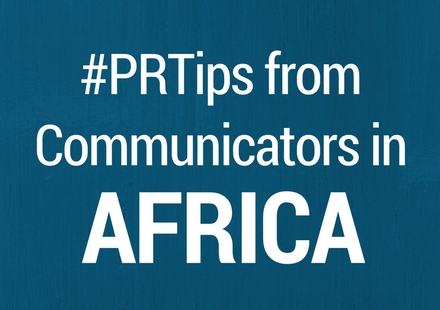Kara Alaimo, is a global PR consultant/trainer and assistant professor of public relations at Hofstra University. She is author of Pitch, Tweet, or Engage on the Street: How to Practice Global Public Relations and Strategic Communication. She looks at the top four things to learn from PR practitioners in Africa:
I recently spent a year interviewing senior public relations professionals in 31 countries about best practices in their cultures for my newly-published book, Pitch, Tweet, or Engage on the Street: How to Practice Global Public Relations and Strategic Communication.
The experience taught me that conventional PR strategies differ significantly around the world – and that we all have a lot to learn from practitioners in other countries. Here are four of the most valuable tips we can learn from communicators in Africa.
Make friends with local influencers.
African countries are very diverse – South Africa alone has eleven official languages; therefore, it is critical to segment and narrowly target audiences. For this reason, South African professionals in particular have become adept at making friends with local influencers.
Merle O’Brien, a former President and Fellow of the Public Relations Institute of Southern Africa, said that local influencers in South Africa’s townships (which are informal settlements outside of major cities where people of predominantly non-white racial groups reside) “may not be educated, with money, but may be at the forefront of what’s hot and what’s not. It’s stature, not economics, that makes a township influencer.”
In rural parts of Africa, local influencers are often the village chiefs. Themba Ngada, Head of Marketing for the City of Cape Town, said that, “if someone wants to interview me and I live in a village, they must talk to the chief first. Short of bringing a proper gift for a chief, which would be a goat or a sheep, a bottle of brandy will do, as this is good currency in rural Xhosaland.”
Micro-targeting and befriending influencers in individual communities is a strategy that could work well in other countries and cultures, too. Local influencers can explain what types of communication strategies will – and will not – work in their communities. You can also try to enlist them to advocate on behalf of your organization.
Invest in relationships.
African communicators practice what scholars call the personal influence model of public relations. They spend a lot of time getting to know other professionals and building trust before they start talking about media coverage, brokering partnerships, or other ways they can work together.
This can lead to greater understanding and, as a result, stronger relationships with organizations that are important to their success.
Consider word-of-mouth strategies.
Interpersonal communication strategies are widely practiced in Africa – even by major brands and the national government. This may involve representatives of an organization interacting directly with the public. For example, Faith Muthambi, Minister of Communications for the South African government, said that “people like to see their leaders; ordinary people sitting under the tree. That’s one thing that our communities love.”
This strategy can also involve asking ordinary people to share SMS messages and content on social platforms with their friends and followers.
“It’s like an old school, word of mouth campaign,” said Kate Thompson-Duwe, Managing Director of the Cape Town-based Amplicon Group. “You develop key messaging that you want people to share and it’s about accessing their networks and ensuring it’s done in an authentic way so that it’s not seen as a branded campaign.”
However, Thompson-Duwe said that this also requires educating clients that they will not be able to fully control their messages. “We guide the conversation, but we need to allow it to be authentic,” she said.
Practice corporate social responsibility.
In Africa, it would be unthinkable to operate in a community or country without implementing corporate social responsibility initiatives.
Solly Moeng, Managing Director of Don Valley, a corporate reputation management firm based in Cape Town, South Africa, said that “people want to know that you give back, that you’re not just taking.”
Doing so can bolster your reputation and establish positive relationships with local audiences. “Giving back to your community can be a big boost to your brand.”
